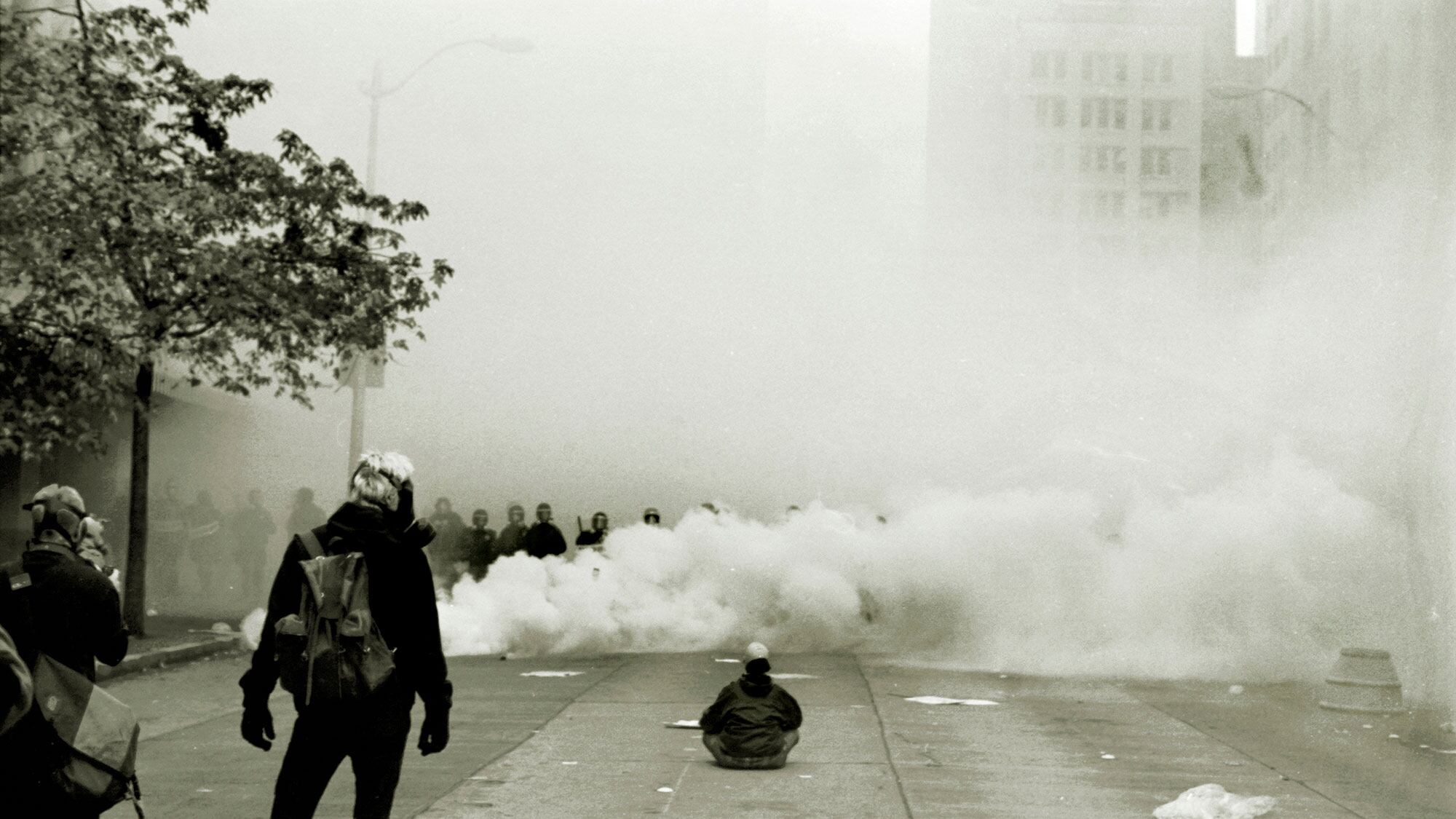On Nov. 14, the Portland City Council will vote on a proposal by Mayor Ted Wheeler to let police tell some protesters when and where they may demonstrate.
The outcome is still in doubt. The City Council is divided, with undecided Commissioner Nick Fish the swing vote. The fate of Wheeler's plan probably hinges on whether the council thinks it's constitutional.
In response, Wheeler points to a test case two decades ago and 175 miles to the north. He has repeatedly cited Seattle's use of an emergency ordinance to shut down several downtown blocks during the 1999 World Trade Organization riots.
"We believe 100 percent it will be challenged in court," Wheeler says, "and we are confident it will be upheld."
Wheeler may get what he wants. But the results in Seattle show that stricter rules are no guarantee people will follow them. And then police will once again have to decide how to respond.
The mayor is right when he says federal courts upheld Seattle's restrictions and found they did not violate First Amendment rights of free speech.
But later, a federal jury found that Seattle police violated the Fourth Amendment—which bars unreasonable searches—when officers enforced the rule by making mass arrests and using tear gas on protesters inside the forbidden zone.
Seattle's police chief at the time tells WW that harshly enforcing the rule was a blunder he still regrets.
"I made the biggest mistake of my 34-year police career when I authorized the use of chemical agents against nonviolent, and indeed nonthreatening, demonstrators," says Norm Stamper, who resigned as Seattle's top cop because of the decision.
Looking back, Stamper says he should have allowed protesters to break the rules and stay put until they decided to leave on their own.
Tensions were high in 1999. The arrival of the WTO in Seattle set off massive anti-globalization protests. About 200 masked anarchists broke dozens of windows. The city wanted to prevent that destructive mob from damaging more property—so it banned everyone else, too. The city closed a 50-block area in downtown Seattle.
That led to local citizens being pepper-sprayed and mistakenly arrested as protesters. Police used tear gas, pepper spray and flash-bang grenades.
Seattle defended its actions in court for more than five years and paid more than $1 million in settlements with more than 150 protesters.
Nineteen years later, Portland faces its own street chaos.
Right-wing protest leader Joey Gibson has come to town more than a dozen times, looking for a violent response. Antifascists have met him at most of those rallies, leading to unhinged brawls that have sent people to the hospital.
Portland has allowed the protests to occur, almost unchecked, because city attorneys believe it is unconstitutional to bar protesters even if they have engaged in violence at previous events. The American Civil Liberties Union of Oregon agrees.
But street violence has the city on edge and officials on their heels. Nearly everyone agrees something needs to change.
Wheeler and Police Chief Danielle Outlaw have argued their proposal will keep police from using force to separate warring protesters. Such force has resulted in more than a dozen lawsuits in the past two years—and Outlaw says she doesn't want her officers wading into fights between extremist groups.
The ACLU has emerged as the harshest critic of Wheeler's plan.
ACLU legislative director Kimberly McCullough says the mayor's ordinance would be impractical to enforce. She points to the difficulty of identifying protesters and the fact that many of these demonstrations pop up without much warning.
"How do they know who is in what group? How do they know who goes to what park?" McCullough asks. "A lot of these protests, they're pretty spontaneous. How is this going to solve anything?"
The mayor's office says the fact that Seattle police were penalized for misusing the rule is actually a plus for Wheeler's plan—because it shows courts will monitor whether Portland police get it right.
"Even though it is legal under the Constitution, the police still need to apply it properly," mayor's spokeswoman Eileen Park says. "The fact that the ordinance is subject to an as-applied challenge is a strength and further safeguard because it allows a court to review how the policy is applied on the streets."
Mary McCord, a senior litigator at the Institute for Constitutional Advocacy and Protection who helped the city of Charlottesville combat white supremacist and militia groups, has endorsed Wheeler's proposal. She says she could identify "no facial constitutional infirmity in the ordinance proposed," and if the ordinance was applied strictly, it would probably be upheld in court.
Stamper, the former Seattle police chief, says making rules to keep protesters where police want them is a tricky balance. But he says no matter the rules, officers must wade in when fights break out—and arrest people who commit assault.
"Police do not have the luxury to say we're not going to engage in this violence, we're just going to let them have it out," he says. "That means early intervention. That means police moving quickly to put an end to the violence the moment it erupts. Far better to prevent it if you can, but it puts the police in America in the unenviable position of trying to prevent something that is not guaranteed to happen."

